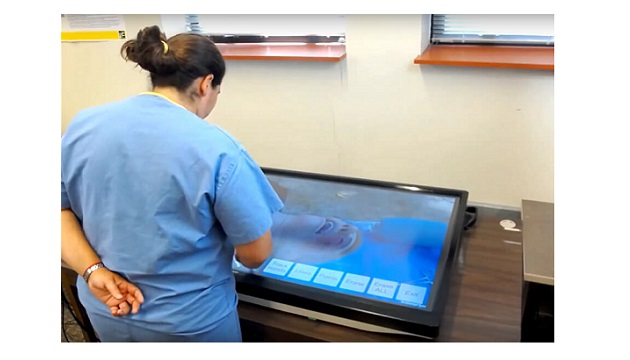Purdue University researchers have developed augmented reality (AR) tools that allow experienced surgeons and physicians around the world to help less-experienced doctors in war zones, natural disasters, and rural areas perform complicated procedures.
“The most critical challenge is to provide surgical expertise into the battlefield when it is most required,” said team leader Juan Wachs, Purdue’s James A. and Sharon M. Tompkins Rising Star Associate Professor of Industrial Engineering. “Even without having highly experienced medical leaders physically co-located in the field, with this technology we can help minimize the number of casualties while maximizing treatment at the point of injury.”
The Purdue technique involves using AR tools to connect health care professionals in remote areas with more experienced surgeons and physicians around the world. The AR headset worn by the mentee in the field is designed to replace current telestrator technology, which uses a separate video screen and freehand sketches to provide feedback.
“There is an unmet need for technology that connects health care mentees in rural areas with experienced mentors,” said Edgar Rojas Muñoz, a doctoral student in industrial engineering who worked on the project. “The current use of a telestrator in these situations is inefficient because they require the mentee to focus on a separate screen, fail to show upcoming steps, and give the mentor an incomplete picture of the ongoing procedure.”
The Purdue system features a transparent headset screen display that allows mentees to see the patient in front of them, along with real-time on-screen feedback from the mentor. That mentor is at a separate location using a video monitor to see the AR feed and provide instant feedback to the field surgeon.
Purdue’s system uses computer vision algorithms to track and align the virtual notes and marks from the mentor with the surgical region in front of the mentee.
“Our technology allows trainees to remain focused on the surgical procedure and reduces the potential for errors during surgery,” Muñoz said.
The U.S. Department of Defense supported the research as it looks to connect its medical professionals in the field with specialists back at the bases who can provide critical guidance during procedures.
In the next few months, the technology will be tested at a Navy base in Virginia, where mentees and mentors will experiment with a simulated battlefield.








